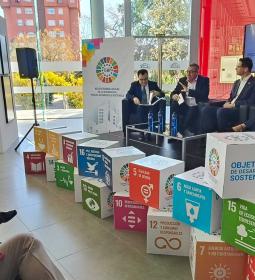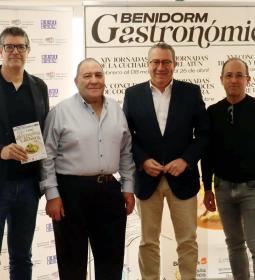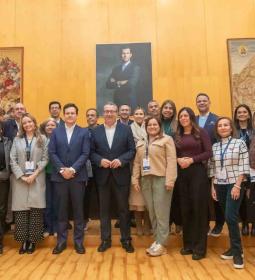Mayor Toni Pérez exposes the reality of Benidorm: "the vertical and accommodation model reduces the generation of MSW person/inhabitant/day by 28%"
Benidorm and its waste management, a success story at the UNWTO Sustainable Destinations Summit

The mayor of Benidorm, Toni Pérez, has participated this morning in the second of the sessions of the opening day of the Summit of Sustainable Destinations that the World Tourism Organization develops in Palma de Mallorca from today until Saturday, focused on the management of waste
Benidorm has shared a panel with the practical experiences developed by the North American companies Stinia Inc and Islands Trails Network, and the Spanish companies Mintsait/Indra and Iberostar Hotels.
Toni Pérez, in his presentation, highlighted the significance of Benidorm as the first certified Smart Tourist Destination in the world, the importance of the UNE 178501 Standard and the Red DTI methodology developed by Segittur that in 2018 made it possible to be the first to exceed 80% of the indicators in the five DTI axes. Benidorm, explained Pérez, “is a city that offers 65,000 regulated places, which exceeded 16.5 million overnight stays in 2019 and which has effective protection over the territory of 61% thanks to the effectiveness of a vertical urban model, accommodation modality hotel industry and permanent work on universal accessibility that enables 70% of trips on foot and offer and 134 km of cycle paths”.
Pérez stressed the importance of the model in reducing water consumption, "by 18% in the last 25 years, with a growth of 40% in the population and 26% in overnight stays", highlighting "the water yield of the distribution network of 96%” as well as the implementation of a consumption monitoring system.
Pérez recalled that "since March we have had a new tool, in Dinapsis Lab, with Hidraqua, which analyzes the environmental quality of the entire city". “The 19 ecosystem indicators demonstrate in an impartial and certified way the good state of environmental health in Benidorm”, highlighted the mayor.
The strong point of the Benidorm exhibition has been, at this summit, on the issue of urban waste management (RSU). Toni Pérez explained the process "in a city that, due to its shape and layout, allows for more efficient collection and in less time, in four hours" and that, due to its commitment to urban development and the accommodation model, "manages to reduce the ratio of waste production which for Benidorm is 28% lower than the national average”
Pérez reviewed the local system that integrates the transfer and packaging plants and the eco-park, which has a mobile unit that travels through neighborhoods to facilitate the process for neighbors and residents.
The mayor explained part of the process that takes place in Benidorm and from Benidorm, highlighting that, for example, "the light packaging plant in Benidorm processes 30% of those generated in the Valencian Community".
Outstanding mention in the intervention of the mayor of Benidorm for the chapter on the recovery of glass containers: "Benidorm is one of the 8 municipalities in Spain that manage to recover more than 56 kilos per inhabitant and year: Benidorm recycles three times more than the Spanish average ”. For Pérez, it is very significant that "with the amount of glass recovered in Benidorm, CO2 emissions equivalent to a trip of more than 24,000 kilometers are avoided: like going from Benidorm to our antipodes and back",
Finally, Toni Pérez highlighted one of the main bastions of this process in Benidorm: "a first-rate ally such as the hotel plant". He indicated that Hosbec, “among other initiatives, develops “important management strategies to reduce waste”.
In his presentation, he highlighted the projects of the hotel management association to promote the circular economy and detailed some practices.
In the sessions that began this morning at the Summit of Sustainable Destinations in Palma de Mallorca, success stories are analyzed and presented in the areas of water, waste, circular economy, data analysis for decision-making in tourism sustainability initiatives and of human development.
Experts, technicians, entrepreneurs and company managers, organizations and institutions from Spain, the United States, Sweden, Monaco, the United Kingdom, Germany, Portugal, Turkey and the Maldives take part in the panels.







